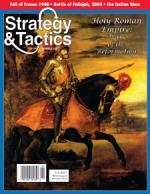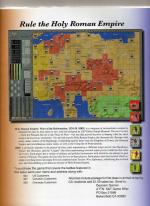Produktbeschreibung
Holy Roman Empire: Wars of the Reformation, 1524-38
Holy Roman Empire: Wars of the Reformation, 1524-38 (HRE) is a wargame of intermediate complexity intended for play by four, three or two, and was designed by S&T Editor Joseph Miranda. The era it covers - from the Peasants Revolt to the Truce of Nice - was one that proved decisive in shaping what has since come to be known as 'modernity.' On one side was the Holy Roman Empire, the (theoretically) Europe-wide polity under control of the Hapsburgs. Contending against them were the Kingdom of France, the Ottoman Empire and miscellaneous minor states, as well as the rising tide of Protestantism.
HRE is primarily intended to be played by four, each representing a different major power: the Hapsburgs, France, the Ottomans, and the "League" (the latter representing assorted minor power coalitions that came and went). Each player has a variety of military and political instruments with which he can attempt to gain control of Europe. The rules are written with procedures for four-player games in mind; however, games with three or two players can also be managed by using the altered framework provided for such contests. Each game turn consists of the following phases.
1) Initiative Determination Phase. Players determine who among them will be
the "first player" for the coming game turn. The first player takes
his player turn first during that game turn, with every other player
taking his own player turn in turn proceeding clockwise around the table
from the first player.
2) Negotiation Phase. Players may make agreements with each other.
3) Imperial Diet Phase. Starting with the first player, potentially each
player other than the Ottoman may call for an "Imperial Diet." There may
not be more than one Imperial Diet per game turn, and there need not be any.
4) First Player Turn.
a) Taxation Phase. The phasing player receives gold points equal to the
total economic values of the cities he controls.
b) Recruiting Phase. The phasing player may expend gold to build new units,
pick campaign markers, place fortress and/or civilization markers and/or
to remove pillage markers. He may also initiate bidding for any
one available mercenary unit.
c) Diplomacy Phase. The phasing player may conduct diplomacy to gain control
of minor powers.
d) Movement Phase. The phasing player may decide to move none, some, or all
of his units. Non-phasing players may declare "countermarch" by
expending Forced March markers, which work to temporarily interrupt
the moves of the phasing player.
e) Combat Phase. The phasing player must attack with those of his
forces occupying squares that contain other players' units.
f) Pillage Phase. The phasing player may attempt to pillage squares
occupied solely by his units.
g) Provisioning Phase. The phasing player pays the maintenance costs for
his units, or else suffers attrition.
5) Second Player Turn. The second player becomes the phasing player and
executes the same steps described above, only using his own forces.
6) Third Player Turn. The third player (if any) becomes the phasing player
and executes the same steps described above, only using his own forces.
7) Fourth Player Turn. The fourth player (if any) becomes the phasing player
and executes the same steps described above, only using his own forces.
8) End of Game Turn Administration. All the players together take
actions designated as taking place at the end of a game turn. |




